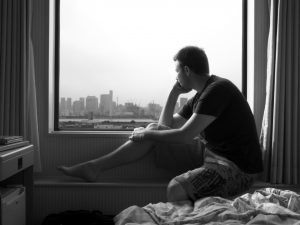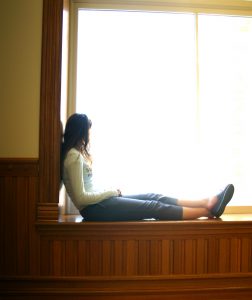When we think of loneliness, it is too easy to only think only of older people who live alone. That seems to be the stereotypical image we have in our minds. The old woman or man living alone. Maybe they have outlived their partner. Only see their children and grandchildren now and gain. Or maybe they have no family to speak of and just the occasional visit from a health worker. It is worth bearing in mind, that living alone and being lonely do not necessarily go and in hand.

At the opposite end of the scale, the idea that young people get lonely, doesn’t quite ring true. After all, they have others around them at school or university. Plenty of people to talk to or socialise with. But maybe that just a very simplistic way to look at it. What if we have been conditioned to think it is just the elderly that get lonely. Surely it must be the case that everyone feels lonely sometimes?
My work has taught me to be more open to all possibilities and not make assumptions on a person’s age or living circumstances. We live in a world with billions of people, yet making friends or finding relationships is often a struggle. We walk past hundreds of people each day as we go to work or pop to the shops. Yet we speak to very few, if any at all.
For many years living in London, I travelled here and there on the London Underground. Literally thousands of people I saw around me, but who ever took time to speak to me. On trains and buses no one even looks at each other, let alone makes conversation. Well okay, a handful do, now and again. But the point I am making is we are surrounded by people. People who are going through the same things we all go through, yet we make no connection.
Everyday life before lockdown was one of loneliness and isolation for many people. Maybe in some way they are coping better now, or much the same. Or maybe the little they did have just got less. Then of course, there are the many others who were not feeling lonely. Until that is, they were forced through law and moral obligation to distance themselves from the people around them. During this unusual time, millions have combined their efforts to stay safe and save lives. What we once took for granted, when we could see family, friends or those familiar faces, have all for the most part been put on hold.

According to one survey of adults in the UK, which took part at the beginning of April, one in four (24%) reported feelings of loneliness in the last two weeks of March. The survey noted that just a month before, that the figure was one in ten (10%) of people had feelings of loneliness. In just a matter of weeks, social distancing left many millions of people feeling lonely and isolated throughout the British Isles. And since lockdown began it was young people 18 to 24 which were most likely to experience loneliness. Before lockdown one in six (16%) had reported feeling lonely. After lockdown it rose dramatically to almost half (44%) feeling isolated or lonely. Young people being three times more likely to have experienced loneliness once lockdown kicked in.
Many people feel lonely from time to time. These short-term feelings will do little to upset the balance of our mental health. However, the longer people are isolated or feeling lonely during the lockdown period, the more likely they are to suffer longer term complications to their mental wellbeing. Long term loneliness is often associated with an increased risk of depression, anxiety, irrational thinking, worry or stress. The impact of loneliness therefore can lead to other complications or health conditions, both mentally and physically.

We have all had to adapt to the current Corona Virus situation. We’ve seen people give us a wide berth as we walk along the pavement. Having to spend much more time at home and only going out for essentials. Keeping our distance from people. Constantly washing our hands. Wearing face coverings or spraying sanitiser every time we touch something. Those added extras to keep us safe. Get to the shops and there are arrows and feet signs and two metre signs and plastic guards at the counter. Well, you get the drift. There has been enough to adjust to, so to be left alone or feel alone, is just an added burden no one should have to endure.
The way we have all stayed in touch has changed. Phone calls are more regular. Video calls or WhatsApp use is up. Connections to Facebook or YouTube have never been so popular. Zoom I had never really heard of and now every other person tells me they have been on there, organising get togethers, meeting with work colleagues or family time. But somehow, it’s just not the same as having people there in front of you. We all know it and it is just another thing nagging at us, reminding us life is not quite how we would like it.

Then, on the last Sunday of October, the clocks went back. A week later, according to the Office for National Statistics (ONS), Britain experienced its highest levels of loneliness since the pandemic began. At the start of November, with the evenings becoming darker, there were 4.2 million adults always or often lonely. That compared with the 2.6 million prior to the pandemic. The report also stated that 2.6 million people had not left their home for any reason in the previous seven days. The ONS research, based on surveys of 4,000+ people, found the young were particularly vulnerable. It shows that 16 to 19-year olds were twice as likely to experience loneliness in the pandemic compared to the over 70’s.
What we in the UK really need to do, is recognise that it is okay to feel lonely at times. It is important to realise that the young are feeling it too. Young people have had a difficult time of it. Initially isolated from friends through school, college or university closures. Then, having to miss out on extended family time or being kept apart from grandparents or friends. As well as having their activity groups or clubs put on hold, not once but twice. It is difficult for anyone of any age.

Some, have developed strategies or resilience to deal with life’s unexpected challenges, so are able to adapt and cope in a way which does not impact their mental health. But young people are still learning to do that. Young people still rely heavily on the social infrastructures they have around them. We all need to do our part to look, listen and observe and make sure the young particularly, are getting the support they need. Not just now, but continuously from hereon in.

